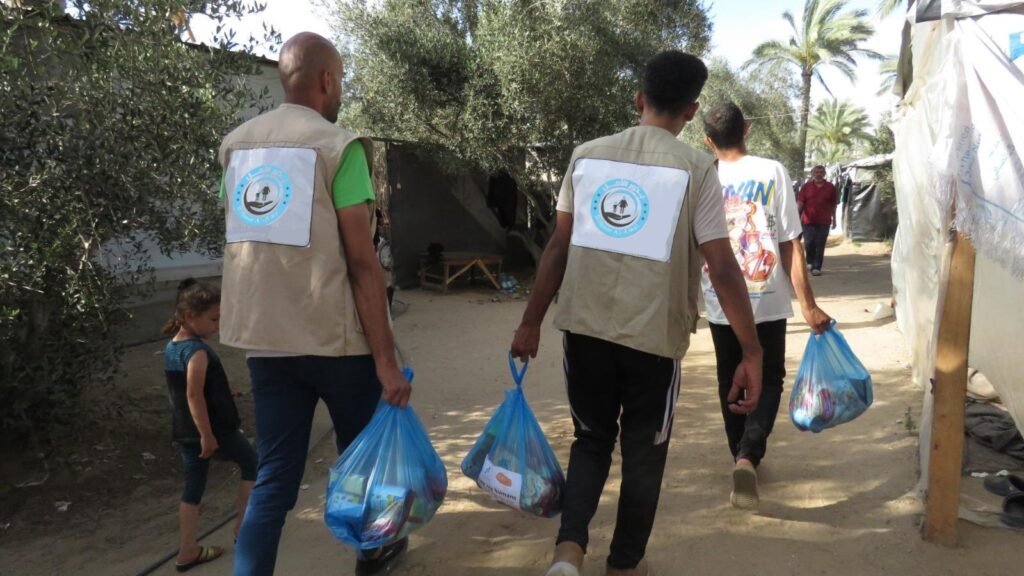Food security is a fundamental human right, yet it remains out of reach for millions of people around the world, especially in conflict-affected regions like Gaza. In a place where economic hardship and political instability have long been the norm, many families face daily struggles just to access basic nutrition. The crisis is not just about having enough food to eat; it’s about having access to nutritious, balanced meals that promote health and well-being.
Organizations like Bithoor Al-Amal have been at the forefront of addressing food insecurity in Gaza, working tirelessly to ensure that vulnerable families receive nutritious meals that sustain not just their bodies but also their hope for a better future. In this article, we explore the critical issue of food security, the importance of nutrition, and how Bithoor Al-Amal and the global community can work together to make a lasting impact.
Understanding Food Security
Food security goes beyond the mere availability of food. According to the Food and Agriculture Organization (FAO), food security exists when all people, at all times, have physical, social, and economic access to sufficient, safe, and nutritious food that meets their dietary needs and food preferences for an active and healthy life. This definition highlights three main components: food availability, food access, and food utilization.
- Food Availability: This refers to the presence of adequate food supplies, either through local production or imports. In Gaza, however, the blockade and restricted movement of goods have led to significant challenges in maintaining a consistent food supply.
- Food Access: Economic barriers prevent many families from accessing available food, especially in an environment where unemployment rates are extraordinarily high.
- Food Utilization: Even when food is available and accessible, it must be nutritious and safe. Proper nutrition is vital for growth, cognitive development, and overall health, particularly for children and pregnant women.
The Food Crisis in Gaza
The Gaza Strip is one of the most densely populated areas in the world, with over two million residents living under the pressure of a prolonged blockade and repeated conflicts. These factors have devastated the local economy and destroyed infrastructure, making food security a persistent challenge. The United Nations and various humanitarian agencies have reported that more than two-thirds of Gaza’s population is food insecure, with many families relying on food aid for survival.
Food insecurity has a devastating impact on health, particularly for children. Malnutrition is a widespread issue, contributing to stunted growth, weakened immune systems, and long-term developmental challenges. Pregnant women and the elderly are also at high risk, suffering from nutrient deficiencies that affect their quality of life. In this context, ensuring that people have access to nutritious meals is not just a matter of survival but a foundation for a healthier and more resilient community.
The Importance of Nutritious Meals
While ensuring that families have enough to eat is crucial, the quality of food is equally important. A balanced diet rich in vitamins, minerals, and essential nutrients is necessary for maintaining good health and preventing disease. For children, proper nutrition supports brain development, enhances learning abilities, and boosts physical growth. For adults, it improves productivity and resilience to illnesses.
Malnutrition can have long-lasting effects, particularly in children, who may experience impaired cognitive development and physical growth if their nutritional needs are not met. Additionally, nutrient deficiencies weaken the immune system, making individuals more susceptible to infections and diseases. This is why the focus must be on providing not just any food, but food that is rich in essential nutrients.
How Bithoor Al-Amal is Ensuring Food Security
Bithoor Al-Amal has recognized the urgent need for addressing food insecurity in Gaza and has developed comprehensive strategies to ensure that families receive nutritious meals. The organization’s efforts are rooted in sustainability, community engagement, and a commitment to improving overall well-being.
- Distribution of Nutritious Food Packages
One of the primary initiatives of Bithoor Al-Amal is the distribution of food packages to vulnerable families. These packages are carefully curated to include a variety of nutrient-rich foods that meet the dietary needs of all family members. Staples like rice, beans, lentils, and canned vegetables provide essential carbohydrates and protein, while fortified flour and cooking oil ensure that families get the vitamins and fats they need for energy and health. The organization also includes baby formula and special nutritional supplements for children and pregnant women, addressing the needs of those most at risk of malnutrition.
- Community Kitchens and Hot Meal Programs
Understanding that not all families have the means to prepare meals at home, Bithoor Al-Amal has established community kitchens that provide hot, nutritious meals. These kitchens serve as a lifeline for those who lack access to cooking facilities or ingredients. The meals are prepared with a focus on nutritional balance, ensuring that they include fresh vegetables, protein sources, and healthy grains. Beyond providing sustenance, these community kitchens foster a sense of belonging and mutual support among residents, strengthening the social fabric of the community.
- Nutritional Education and Awareness Campaigns
Providing food is only one part of the equation; educating families about nutrition is equally important. Bithoor Al-Amal runs awareness campaigns and workshops that teach families how to make healthy food choices, even with limited resources. These sessions cover topics like meal planning, understanding food labels, and the importance of a balanced diet. By empowering families with knowledge, the organization ensures that they can make informed decisions about their nutrition, promoting long-term health.
- Support for Local Farmers and Food Production
To address the root causes of food insecurity, Bithoor Al-Amal has launched initiatives to support local farmers and boost food production in Gaza. By providing farmers with seeds, tools, and training, the organization helps increase the availability of fresh produce in local markets. This not only improves food security but also stimulates the local economy, creating a more sustainable and resilient food system. The organization also encourages urban gardening and home-based agriculture, allowing families to grow their own vegetables and herbs, even in small spaces.
The Challenges and How We Can Overcome Them
Despite these efforts, Bithoor Al-Amal faces numerous challenges in its mission to ensure food security. The blockade on Gaza limits the import of essential supplies, while repeated conflicts disrupt agricultural activities and destroy infrastructure. Additionally, the high cost of nutritious food makes it difficult for many families to maintain a balanced diet.
To overcome these challenges, Bithoor Al-Amal continues to innovate and adapt. The organization collaborates with international partners to secure funding and resources, ensuring that food aid programs can be sustained and expanded. By advocating for policy changes and raising global awareness, Bithoor Al-Amal also works to address the systemic issues that contribute to food insecurity.
How You Can Help
Ensuring food security for those in need requires a collective effort, and there are many ways you can contribute:
- Donate to Support Food Security Initiatives
Your financial contributions can make a significant difference in the lives of families in Gaza. Donations to Bithoor Al-Amal help fund the purchase of nutritious food items, the operation of community kitchens, and the delivery of educational programs. Every dollar counts, and even small donations can provide meals for families in need.
- Raise Awareness and Advocate for Change
Use your voice to raise awareness about the food crisis in Gaza. Sharing information on social media, participating in advocacy campaigns, and engaging with policymakers can amplify the call for action. The more people who understand the severity of the situation, the more support can be generated to address it.
- Volunteer Your Time and Skills
If you have expertise in nutrition, agriculture, or community development, consider volunteering your time with Bithoor Al-Amal. Remote volunteering opportunities, such as providing nutrition education or assisting with program management, can have a meaningful impact.
- Support Sustainable Food Practices
Promote sustainable food practices in your own community and encourage others to do the same. Supporting local farmers, reducing food waste, and choosing nutrient-rich foods can help build a global culture of food security and sustainability.
Stories of Hope and Resilience
The work of Bithoor Al-Amal is filled with inspiring stories of resilience and hope. One such story is that of Hanan, a mother of five who struggled to provide nutritious meals for her children. With the help of Bithoor Al-Amal’s food package program, Hanan not only received essential food supplies but also attended nutrition workshops. Today, she feels more confident in her ability to provide balanced meals for her family and has even started growing vegetables in her small backyard.
Another story is of Youssef, a farmer who lost his crops due to conflict. With support from Bithoor Al-Amal, Youssef received seeds and agricultural training, allowing him to restart his farming business. His fresh produce now feeds dozens of families in his community, demonstrating the power of local food production in creating food security.
Conclusion:
Food security is a shared responsibility that requires the collective efforts of individuals, organizations, and governments. By ensuring that families have access to nutritious meals, we invest in the health, well-being, and future of entire communities. Bithoor Al-Amal has shown that even in the face of immense challenges, dedicated action can make a significant difference.
Together, we can create a world where no one goes to bed hungry and where every child has the opportunity to grow up healthy and strong. Let us support initiatives that promote food security, advocate for systemic change, and stand in solidarity with those who need it most. In doing so, we bring nourishment and hope to families in Gaza and beyond.




